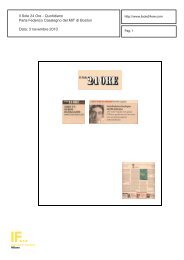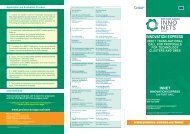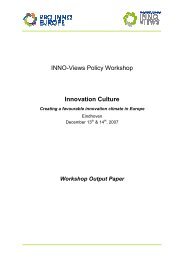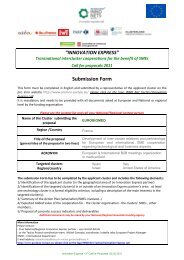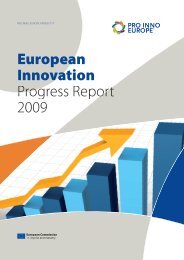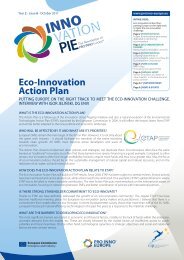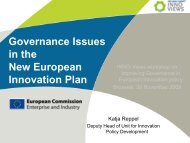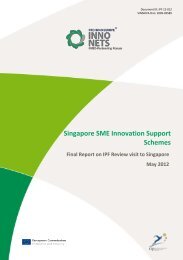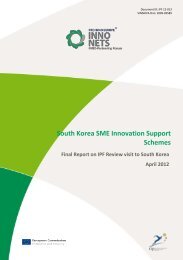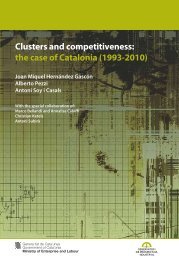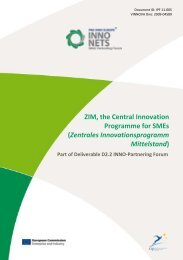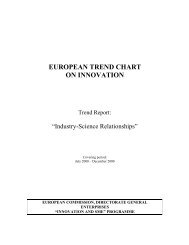Benchmarking National - PRO INNO Europe
Benchmarking National - PRO INNO Europe
Benchmarking National - PRO INNO Europe
You also want an ePaper? Increase the reach of your titles
YUMPU automatically turns print PDFs into web optimized ePapers that Google loves.
132<br />
BENCHMARKING NATIONAL AND REGIONAL SUPPORT SERVICES FOR SMES IN THE FIELD OF INTELLECTUAL AND INDUSTRIAL <strong>PRO</strong>PERTY<br />
is also due to recent global economic developments requiring a stronger use<br />
of formal IP protection mechanisms. SMEs face special disadvantages in this<br />
respect as they are often neither familiar with the patent system nor do they<br />
possess the necessary experience in database research. This makes training<br />
offered to SMEs more relevant.<br />
� Organisation of the “IPR Day” (a conference with IPR speeches; every second<br />
year an inventor’s prize is awarded by the state of Baden-Württemberg).<br />
� On its website, the PIC Stuttgart makes available an extensive collection of<br />
FAQs and the corresponding answers with regard to various IPRs and the<br />
services of the patent information office itself.<br />
� Furthermore, papers by experienced patent attorneys on various aspects of<br />
IPRs are available for download on PIC Stuttgart's website together with<br />
literature recommendations and a list of relevant laws and regulations, official<br />
documents and brochures etc.<br />
� Other services, like the organisation of information events, holding lectures at<br />
universities, teaching students (one day course; one beginner, one advanced<br />
course) the provision of brochures, information material etc., created by the<br />
German PO, copying services and a telephone hotline.<br />
The German Patent Information Centres are working in close relationship with the<br />
German PO. Based on a contract, the German PO passes on patent documents on<br />
paper and on CD-ROM to all PICs and provides advanced Internet services (i.e. the<br />
DEPATISnet-Premium tool) exclusively for all German PICs. Furthermore, the PO<br />
offers free training courses for the PIC staff. In mid 2006, the co-operation between<br />
the PO and all German PICs was strengthened through an agreement, specifying<br />
the tasks that the PICs take over on behalf of the PO (mainly: regional provision of<br />
information on IPRs and creating awareness for the importance of IPRs). In return,<br />
the Patent Information Centres are supported by the DPMA by way of joint<br />
marketing activities, brochures, trainings etc.<br />
After a modification of the patent law in 2001, 11 out of 24 Patent Information<br />
Centres have used the opportunity to accept patent and utility model applications<br />
and forward them to the German PO. Since October 2004, these 11 PICs are<br />
entitled to accept applications for trade marks and industrial designs as well.<br />
However, the latter service element is not in high demand due to a number of<br />
reasons: First, the introduction of the service was not accompanied by a PR<br />
campaign similar in scope to the campaign launched in 2001 for patent<br />
applications. Second, the documentation required for a patent application is much<br />
more voluminous than that needed for a trade mark application. Thus, the costs of<br />
packing and postage are higher. SMEs and patent attorneys can save/reduce more<br />
of these costs by filing the patent application with the regional PIC than they could<br />
in the case of trade marks.<br />
An interesting element of good practice is PIC Stuttgart's information and training<br />
activities in co-operation with technical universities and colleges. Their aim is to<br />
make future technical engineers and thus future (potential) inventors aware of the<br />
IPR system and to provide them with IPR-research skills. Professors and their student<br />
groups visit the PIC Stuttgart listen to information speeches on IPRs and are assisted<br />
in carrying out IPR-researches on their own. Later on in their university career,<br />
students can use these skills for their practice-oriented seminar papers or their<br />
diploma theses. After entering (self-) employment, university graduates are<br />
assumed to transfer and introduce their IPR-related knowledge and skills for the<br />
benefit of their employers or their own companies. For already more than ten years<br />
the PIC Stuttgart carries out these awareness-raising activities among technical<br />
universities and colleges and one can assume that they have already developed a<br />
broad effect in the meantime. In 2005 alone, 24 student groups from technical<br />
universities or colleges with 431 participants were informed and trained by the PIC<br />
Stuttgart.



